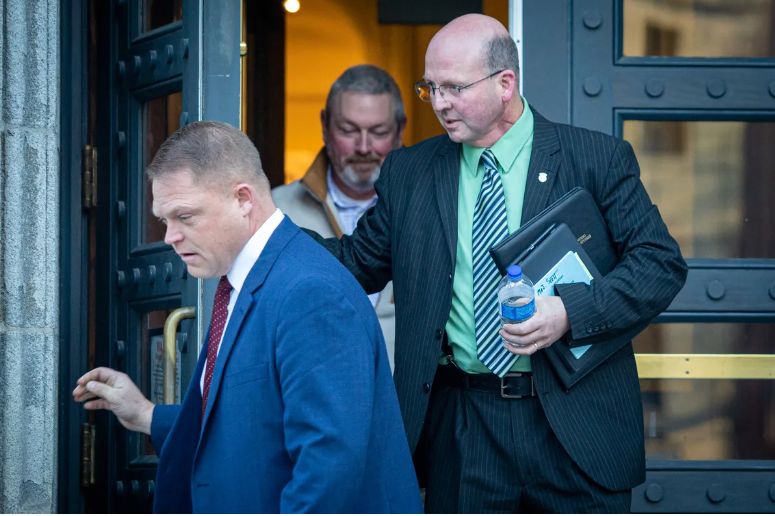The former supervisor of the Maine State Police’s controversial intelligence center testified Tuesday that the unit in some cases collected information about people engaged in lawful behavior but forcefully denied that doing so ran afoul of any laws.
The testimony from former Lt. Scott Ireland and other police officials on the second day of a federal whistleblower trial in Portland painted a more detailed picture of the kind of information-gathering activities at the Maine Information and Analysis Center that concerned former state Trooper George Loder.
Loder sued the state police in 2020, alleging that his supervisors, including Ireland, removed him from a federal task force and forced him to take a voluntary demotion after he told them he believed the so-called fusion center conducted unlawful surveillance of the public. He specifically claimed that the center unlawfully gathered and maintained information about people who protested Central Maine Power’s controversial transmission pipeline, people who applied to buy firearms and counselors who worked at the Seeds of Peace summer camp in Otisfield.
The core dispute centers on whether it is legal for the police to keep such records on law-abiding people. On Tuesday, Loder’s attorney, Cynthia Dill, questioned officials about why the unit kept personal information in its searchable, internal database, where police could later look someone up and find documentation of lawful conduct. The unit’s privacy policy states that it should only collect information related to criminal activity, she noted.
“Did the MIAC activity report collect and store information about citizens engaged in lawful activity, such as CMP protests?” Dill asked Ireland, referring to a reported instance where the unit had gathered information about people who attended a public meeting about the pipeline in Farmington as well as social media posts that included names.
“I would say yes, just as any law enforcement report system,” he said, though he wasn’t aware of the CMP report specifically. But some of that information might be “built on” in the context of a criminal investigation, he said. “It could be legal activity, but, in law enforcement, we have to prepare if it turns into something negative.”
As for the social media posts, he noted that those were posted publicly, and it was not against the law for police or anyone to gather them. The unit’s former privacy officer, Chris Parr, testified on Monday that he found the collection and retention of the information about the CMP protesters concerning.
“I’ve never been party to us tracking particular names or people or anyone we are watching, if that’s what you’re saying,” Ireland said.
Ireland, along with Lt. Michael Johnston, who formerly supervised Loder at the unit, and former Det. David Pelletier, who worked in the unit until August 2018, described how analysts would save information in an internal database so long as it met criteria related to its purpose.
That included doing background checks for counselors at the Seeds of Peace camp, pursuant to an agreement between the agency and the camp. Dill asked if that meant the unit had the names, dates of birth and possible social security numbers of counselors on file. Pelletier said that was likely.
As for gun owners, “It was portrayed like we were logging every purchaser of a weapon,” Ireland said. But the unit simply fielded about 40 or 50 requests for information a year from the federal government about people who tried to buy a gun and were flagged as having ties to a criminal entity.
“If we are tasked with a duty, we will keep a record for the federal government,” he said.
Dill pressed Johnston about whether the center ever purged information from its database that did not result in criminal activity, to which he replied he was unaware if it ever had.
Both he and Ireland maintained that federal privacy rules did not apply to the unit’s internal log, referred to as “activity reports.”
“I personally would not tolerate anything illegal going on in that center or any inappropriate conduct,” Ireland said.
Johnston and Ireland’s conviction that the fusion center wasn’t doing anything illegal is also why they said they did not look into Loder’s concerns when he raised them in a pair of meetings in May 2018, when the men informed Loder he was being called back to the unit from his posting on a federal counter-terrorism task force. The men denied the move was retaliatory, saying they were not aware Loder had concerns about the fusion center beforehand.
Loder has also claimed he was removed from the task force because he refused to share information about his work during the fusion center’s weekly meetings. Johnston, who in 2017 asked Loder to share information about his role with the group more routinely, testified that he never asked Loder to violate any federal laws or policies in doing so.
Federal officials on the task force testified Tuesday that Loder, worried about Johnston’s directive, checked in with them about what he could share, but they did not recall specific details.
Loder was called back to replace Pelletier, who had announced plans to retire, Johnston said. When Dill asked Pelletier on Tuesday if he remembered why Loder was called back to the fusion center, she had to jog his memory with a transcript of his deposition last year in which he said he thought it was because Loder wasn’t reporting back enough information.
“‘The why? I don’t know,’” Dill quoted Pelletier as saying in the deposition. “‘Was his coming back because Sgt. Johnston and Lt. Ireland were not happy? That was my opinion.’”




